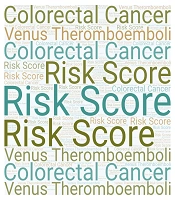Dear Editor,
Colorectal cancer affects both genders and is the third most common cancer globally. It is also the third leading cause of cancer-related deaths (1, 2). Venous thromboembolism (VTE) is a frequent complication in cancer patients that can disrupt cancer treatment and result in severe complications or death. Thromboembolic events are the second most common cause of death among cancer patients (2).
It is widely acknowledged that the administration of thromboprophylaxis can significantly reduce the likelihood of VTE, or venous thromboembolism. To achieve this objective, several criteria have been established, and one of the most prominent ones is the Khorana risk score. This score is primarily intended for cancer patients who are mobile and is based on multiple variables, including the type of cancer. For instance, cancers that have a higher probability of VTE, such as stomach and pancreas cancers, are assigned 2 points, while those with a lower risk, such as lung, lymphoma, gynecological, bladder, or testicular cancers, receive 1 point. By utilizing this score, healthcare professionals can identify those cancer patients most at risk of developing VTE and take proactive measures to prevent it (3, 4). It is essential to give special attention to the modification of the scoring system in the Khorana risk score. This is because there is a strong connection between CRC and VTE, and several factors contribute to an increased risk of VTE. These factors include major abdominal surgeries lasting more than 3 hours, prolonged immobility after surgery, the use of thrombogenic medications such as chemotherapeutic agents, advanced age, obesity, high metastatic risk during diagnosis, peritoneal carcinomas, and CRC undergoing hyperthermic intraperitoneal chemotherapy (HIPEC), significant anemia requiring blood transfusion, smoking, and sedentary lifestyle. It is essential to take these factors into account to manage VTE risk effectively. Moreover, the introduction of new thromboprophylaxis drugs, which not only offer substantial benefits but also pose a lower risk of bleeding (a major concern when prescribing anticoagulants to these patients), has raised the prospects for a better quality of life for them (5).
In the cardio-oncology department of Shahid Rajaei Hospital in Iran, some patients with colorectal cancer experienced symptoms such as dyspnea, edema, leg length discrepancy, chest pain, and thrombosis in various organs, including the heart. Echocardiography showed thrombosis in the RA, RV, and LV. While this is an important issue, further randomized controlled trials are necessary to confirm these findings of colorectal cancer. We suggest modifying the thromboprophylaxis scoring system to increase awareness, improve prognosis, and enhance the quality of life for colorectal cancer patients by assigning a higher score to colorectal cancer in the creation of thromboembolism.
